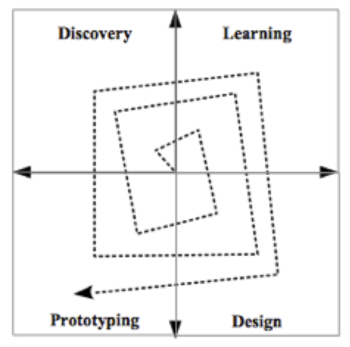Difference between revisions of "Practices"
Bill.mciver (talk | contribs) (→Applied Research & Experimental Development) |
Bill.mciver (talk | contribs) (→Design Thinking) |
||
| Line 82: | Line 82: | ||
* Disciplined processing of design failures | * Disciplined processing of design failures | ||
* Refinement of the above through iteration | * Refinement of the above through iteration | ||
| + | |||
| + | [[File:Nbcc_ca_mobi_diag-designthinking.png | 350px]] | ||
=== Knowledge Mobilization === | === Knowledge Mobilization === | ||
Revision as of 16:41, 18 April 2017
// Place. Standard NBCC.ca Header here //
Contents
Practices
The core practices of the Mobile First Technology initiative (MFTi) are Applied Research and Experimental Development. These core practices are organized into the following activities:
- Mobile Software Systems Development
- Mobile Hardware Systems Development
- Evaluation & Experimentation
- Analysis
- Design Thinking
- Knowledge Mobilization
- Training
Applied Research & Experimental Development
- MFTi supports a program of applied research and experimental development in the service of early-stage mobile product and service development.
- Our clients include New Brunswick companies and organizations, and NBCC students, faculty, and staff.
- We complement New Brunswick’s later-stage innovation programs by focusing on the scientific and technical aspects of product and service development.
- We perform applied research and experimental development activities within the Mobile Ideaspace, a distributed research facility spanning NBCC’s six campuses that enables us to leverage faculty and staff expertise across NBCC's six campuses.
Definitions
The Frascati Manual of the Organisation for Economic Co-operation and Development (OECD) defines the linkages between basic research, applied research, and experimental development. Research and development (R&D) is defined broadly as comprising “creative work undertaken on a systematic basis in order to increase the stock of knowledge, including knowledge of man, culture and society, and the use of this stock of knowledge to devise new applications”. Relative to R&D, basic research is defined as “experimental or theoretical work undertaken primarily to acquire new knowledge of the underlying foundation of phenomena and observable facts, without any particular application or use in view”. Relative to basic research, applied research is defined as “original investigation undertaken in order to acquire new knowledge. It is, however, directed primarily towards a specific practical aim or objective”. Relative to all of the above, experimental development is defined as “systematic work, drawing on existing knowledge gained from research and/or practical experience, which is directed to producing new materials, products or devices, to installing new processes, systems and services, or to improving substantially those already produced or installed”.
OECD (2015), Frascati Manual 2015: Guidelines for Collecting and Reporting Data on Research and Experimental Development, OECD Publishing, Paris. DOI: http://dx.doi.org/10.1787/9789264239012-en
We define early-stage product and service development as the transformation of basic and applied research knowledge into new product or service concepts and prototypes that can be used to evaluate those concepts and, if warranted, to initiate a commercialization process. Early-stage product and service development can be seen as the concept stage within models of new product development.
Holger Ernst, Wayne D. Hoyer, and Carsten Rübsaamen. "Sales, marketing, and research-and-development cooperation across new product development stages: implications for success." Journal of Marketing 74.5 (2010): 80-92.
Mobile Software Systems Development
MFTi designs and develops mobile software systems, including mobile apps and external systems required to support them.
We have experience with several approaches to mobile app development:
- Native app development, including Android, BlackBerry, and iOS;
- Mobile Web app development, including
- Responsive Web design technologies, such as Boostrap,
- Progressive Web design technologies, such as Google Polymer, and
- Isomorphic JavaScript frameworks, such as React;
- Cross-platform app technologies, such as Xamarin and React Native.
Systems required to support a mobile app typically include Web services software, but may also include mobile hardware.
We have experience in developing Web services and data management solutions to support mobile apps, including the following approaches and technologies:
- RESTful Web services, including Rails and Node.js;
- Relational and spatial database design and management using MySQL and Postgres; and
- Time series databases using openTSDB.
Mobile Hardware Systems Development
MFTi designs and integrates custom hardware solutions in the following categories:
- 3D printing,
- Biometrics,
- Embedded systems,
- Internet of Things,
- Mechatronics,
- Spatial and geo-spatial, and
- Robotics.
Evaluation & Experimentation
MFTi evaluates new mobile technologies; and MFTi designs, configures, and conducts experiments involving mobile technologies.
Analysis
MFTi performs analytical research on mobile information and communication technologies, and related areas. See Publications.
Design Thinking
MFTi prioritizes human-centred design and prototyping activities in pursuit of innovative solutions. We strive to apply the following methods within these activities, when possible:
- Immersion in the environments of typical users
- Observation of or acting as typical users
- Structured idea generation
- Frequent user involvement in design, prototyping, and evaluations
- Frequent prototyping and evaluation
- Disciplined processing of design failures
- Refinement of the above through iteration
Knowledge Mobilization
MFTi seeks to transform nonproprietary results of our other practices into learning objects and make them available to NBCC students, faculty, and staff, as well as the broader New Brunswick ICT community. These learning objects include white papers, source code, and schematics.
Training
MFTi develops, organizes, and conducts a variety of professional development activities involving mobile technology topics. These have included webinars and hands-on workshops. See MFTi's past and pending events.
